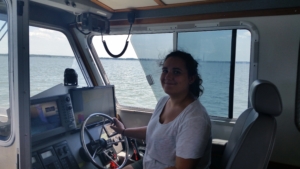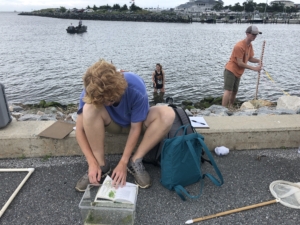In addition to supporting four of our eleven 2019 C-StREAM fellows, the NOAA Chesapeake Bay Office also works with the CRC every year to hire two to four other more senior-level interns (post baccalaureate or graduate students) to help NCBO scientists with summer projects. This year, our interns have been involved in some pretty interesting projects. The internships combine field-based experiences with administrative and technical support duties and offer a unique opportunity to contribute to large-scale, long-term ecological research critical to understanding Bay habitats and living resources.
Here’s a recap of their summers, in their own words.
Rieley Auger
Rieley Auger, is a rising senior at the University of Maryland. Coming from Rhode Island and growing up on a different bay, she was excited to work with the NCBO field team this summer on the Chesapeake and its tributaries. Throughout the summer Rieley has been monitoring oyster restoration reefs in Virginia and Maryland. She used a number of different instruments to collect data like single-beam sonar, multi-beam sonar, and sidescan. These all provide different kinds of imagery for the bottom of whatever system we are working in. Following this internship, Rieley will be starting her last year of undergrad and seeking out more opportunities to make a positive impact in the Chesapeake Bay region.

Rieley at the helm working on the York River in June
Position: Field Technician Intern
What have you been working on this summer? What have you learned?
I have been working with the field team monitoring oyster restoration sites and gathering data on possible future sites. I have learned a lot about the Chesapeake Bay ecosystem and the importance of oysters to the Bay in the past couple weeks.
What advice would you give to future interns in your position?
For interns in the future, I would say to keep an open mind, apply yourself where you can and ask lots of questions. In addition, make a solid relationship with your supervisor(s) because they are only there to help.
Have your thoughts on what you want to do in the future changed at all? If so, how?
This internship has confirmed to me that I definitely enjoy working on the water and will be looking for those opportunities following undergrad.
Emmett Gartner
Emmett Gartner was born and raised in Annapolis, MD. Currently he is a Senior Environmental Studies Major at the University of Vermont with a concentration in Environmental Journalism.
This summer Emmett supported Environmental Science Training Center programming, leading learning activities and facilitating participant work. Emmett also analyzed Environmental Science Training Center participant and survey data, compiled GIS Map of participants’ locations created case studies on experiences of ESTC Workshop participants and case studies on projects of exemplary B-WET grantees. At the end of August Emmett is headed back to Vermont to back to school to finish my final year at UVM, co-piloting UVM’s magazine (Headwaters) to further greatness, leading hiking/backpacking trips for the Outing Club. Emmett aspires to (hopefully) rejoin in the Forest Service after he graduates from UVM.
Position: Environmental Literacy Intern
What have you been working on this summer? What have you learned?
I have been compiling case studies on NOAA environmental education efforts, including B-WET grants and ESTC workshop participants. I also have been helping coordinate ESTC workshops with the rest of the education team here in Oxford. Most recently, we had a group of K-5 teachers come to ESTC for a workshop on Marine and Estuarine Literacy.

Emmett working hard to identify some submerged aquatic vegetation.
There is so much to learn about learning! NOAA has lots of great environmental education initiatives and I have enjoyed thoroughly investigating them. It has also been really cool to see where environmental/science curriculum from my own Maryland public school education originated from.
What advice would you give to future interns in your position?
Never be afraid to ask questions! The world of MWEEs and B-WET can be very intimidating at times, but luckily you are working with top-of-the-line experts. Also feel free to interject any creative ideas you have for communicating ideas or information, everybody is all ears.
Have your thoughts on what you want to do in the future changed at all? If so, how?
This internship has made me reflect very heavily on how I communicate environmental stories and materials to an audience. There are a lot of environmentally-curious folks out there (especially teachers), but sometimes the specificity of language and ideas act as a barrier. Environmental literacy is the gateway to disseminating these ideas, and developing environmental education is a crucial first step.
Jocelyn Dazzo
Jocelyn Dazzo is a rising sophomore at Salisbury University undergoing the dual degree in biology and environmental sciences and minoring in chemistry. She’s from Silver Spring, MD. This summer, she was the intern for the CBIBS program, and worked on programming a GUI for the automation of WQM calibration. Jocelyn will be going back to Salisbury University in a few weeks for her second year of college.
Position: Oceanographic Instrumentation Support Intern
Shadesha Green
Shadesha Green is a PhD candidate at the University of Maryland Center for Environmental Sciences-Institute of Marine and Environmental Technology (UMCES-IMET) in Baltimore, MD. Shadesha is also a fellow in the Living Marine Resources Cooperative Science Center (LMRCSC) supported by the NOAA Education Partnership Program with Minority Serving Institutions (EPP/MSI).This summer Shadesha worked at the NOAA Chesapeake Bay Office (NCBO) under the mentorship of Bruce Vogt to complete her NOAA Experiential Research and Training Opportunity (NERTO). Shadesha’s project was two-fold: develop a conceptual model indicating factors impacting juvenile striped bass nursery habitat and prepare the ‘Chesapeake Bay striped bass nursery habitat assessment’ Request-for-Proposal (RFP) for submission to the Chesapeake Bay Trust. To complete these tasks she worked with a variety of scientists and fishery managers in the Chesapeake Bay region to gather their insight on factors influencing nursery habitat for juvenile striped bass. At the conclusion of her time here at NCBO Shadesha will be returning to IMET to conclude the final portions of her dissertation research. It is Shadesha’s hope to defend her dissertation this coming spring 2020.
Makayla Brown and Sierra Hildebrandt were also working at NOAA this summer through the C-StREAM program. We are grateful to have worked with such a great group this summer!
